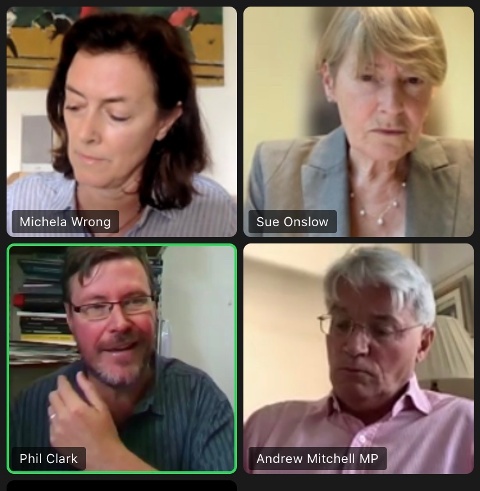
At a time when some in Commonwealth circles are heading to the Commonwealth Heads of Government Meeting (CHOGM) in Rwanda and others are attending back-to-back pre-CHOGM discussions, this online seminar managed to attract quite a bit of attention.
This was hardly surprising as questioning of Rwanda’s suitability to host the CHOGM has been a hot topic since heads agreed on the Kigali venue at CHOGM 2018 in London. Even as the dust settled on this Institute of Commonwealth Studies (ICwS) seminar, a group of civil society groups, issued a statement spearheaded by Human Rights Watch and the Commonwealth Human Rights Initiative, voicing concerns about the human rights situation in Rwanda.
The 8 June seminar, entitled ‘Rwanda and the Commonwealth’, had been organised by the reinvigorated ICwS. It brought together Michela Wrong, the author of Do Not Disturb: The Story of a Political Murder, Professor Phil Clark of the School of African and Oriental Studies (SOAS) and MP Andrew Mitchell, whose African-related credentials including serving on a UK social action project in Rwanda, as secretary of state at the former Department for International Development and as chair of the UK all-party parliamentary group on Rwanda.
Seminar chair, the Institute’s director Sue Onslow, described her panel as providing “informed and energetic and highly engaged comments”. She summed up the discussion as “three very different points of view from three very different perspectives”.
The main event proved to be one of the more robust online discussions in the countdown to CHOGM period.
Michaela Wrong kicked off the session on what she called the “global sales pitch” of Rwandan President Paul Kagame. The author did not pull any punches in her assessment of Rwanda’s record on freedom of speech and its treatment of those who criticised or opposed the government.
The second speaker, Professor Phil Clark, agreed that Rwanda should be scrutinised but repeatedly made the point that such scrutiny should also be applied to all Commonwealth countries, such as Australian for its treatment of its indigenous people and its record on migration.
Andrew Mitchell, who in his time as secretary of state at the former Department for International Development first cut and then restored UK aid to Rwanda, pointed to the progress the country had made since the 1994 genocide. He described the country’s government as a “regime forged in the heat of genocide” which had become confident in its decisions.
All three panellists examined the potential for Rwanda as Commonwealth chair-in-office. Their views ranged from the power of the Commonwealth to shine a light on a country’s record – including the spotlight on the Windrush scandal on the eve of the London CHOGM – to the possibility of CHOGM giving an approval signal to an authoritarian regime.
The robust discussion also included a Q&A session which brought in even more issues, including Rwanda’s relationship with France and its treatment of opposition figures in the Rwandan diaspora.
The panellists agreed that the effectiveness of the Commonwealth would come under scrutiny at CHOGM 2022 following the Covid pandemic. With comments on why the organisation, at a crossroads, was “punching way below its weight”, the discussion focused on the growing criticism of the enforcement of the organisation’s values as laid out in the Commonwealth Charter and its potential for pushing more North-South cooperation.
ICwS director Sue Onslow wrapped up the discussion by pointing out that the Commonwealth’s “critical friends will continue to watch this space very carefully indeed”.
View the video:
Debbie Ransome is the web editor for the Commonwealth Round Table website.
Related articles:
Rwanda and the Commonwealth event summary
CHOGM 2018: Impressions of a former insider



